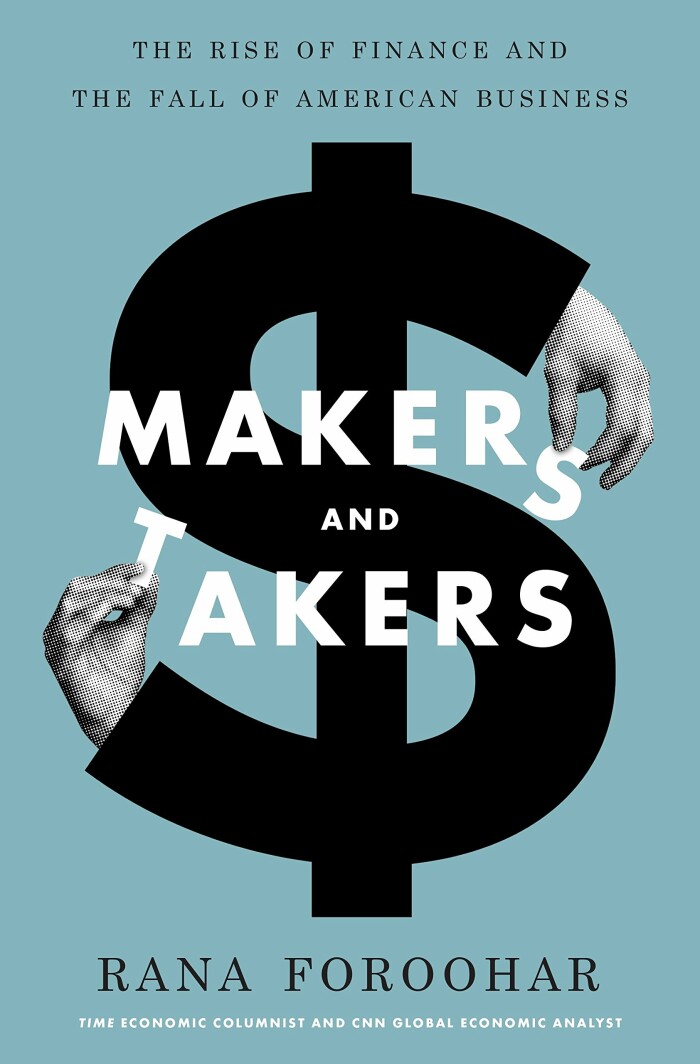
Support the author by purchasing this book with the link below!
PurchaseMakers and Takers
Rana Foroohar
Published: 2017
Makers and Takers: The Rise of Finance and the Fall of American Business is a book by Rana Foroohar that explores the growing influence of the financial sector in the United States and its impact on the overall economy. Foroohar argues that the financial industry, which was once a means of supporting and investing in businesses and industries, has become a "taker" industry that extracts wealth from the rest of the economy rather than creating it. This shift, she contends, has had a number of negative consequences, including increased economic inequality, declining rates of entrepreneurship, and the decline of long-term investment in favor of short-term financial gain.
In order to make her case, Foroohar traces the history of finance in the United States and discusses the ways in which it has evolved over time. She argues that the financial industry has become increasingly divorced from its original purpose of supporting and investing in businesses, and has instead become focused on extracting wealth through short-term financial maneuvers and speculative activities. This shift, she contends, has contributed to a decline in productive investment, such as research and development, and has led to a decline in the number of new businesses being created. It has also contributed to increased economic inequality and a decline in the overall health of the economy.
Foroohar also discusses the ways in which the financial industry has shaped American society and business. She argues that the focus on short-term financial gain has led to a decline in the quality of products and services, as well as a decline in the long-term stability of businesses. It has also contributed to a decline in the overall quality of life for many Americans, as the focus on financial gain has led to a neglect of other important social and economic issues.
In addition to examining the negative consequences of the financial industry's increasing influence, Foroohar also offers proposals for how to address these problems and restore balance to the economy. These include stronger regulation of the financial industry, an increased focus on long-term, sustainable growth, and a shift away from the shareholder primacy model, which emphasizes the interests of shareholders above all else.
In order to make her case, Foroohar traces the history of finance in the United States and discusses the ways in which it has evolved over time. She argues that the financial industry has become increasingly divorced from its original purpose of supporting and investing in businesses, and has instead become focused on extracting wealth through short-term financial maneuvers and speculative activities. This shift, she contends, has contributed to a decline in productive investment, such as research and development, and has led to a decline in the number of new businesses being created. It has also contributed to increased economic inequality and a decline in the overall health of the economy.
Foroohar also discusses the ways in which the financial industry has shaped American society and business. She argues that the focus on short-term financial gain has led to a decline in the quality of products and services, as well as a decline in the long-term stability of businesses. It has also contributed to a decline in the overall quality of life for many Americans, as the focus on financial gain has led to a neglect of other important social and economic issues.
In addition to examining the negative consequences of the financial industry's increasing influence, Foroohar also offers proposals for how to address these problems and restore balance to the economy. These include stronger regulation of the financial industry, an increased focus on long-term, sustainable growth, and a shift away from the shareholder primacy model, which emphasizes the interests of shareholders above all else.
1. The financial industry has become a "taker" industry that extracts wealth from the rest of the economy rather than creating it.
2. This shift has contributed to a decline in productive investment, such as research and development, and has led to a decline in the number of new businesses being created.
3. The focus on short-term financial gain has led to a decline in the quality of products and services, as well as a decline in the long-term stability of businesses.
4. The financial industry's increasing influence has contributed to increased economic inequality and a decline in the overall health of the economy.
5. To address these problems, there is a need for stronger regulation of the financial industry, a focus on long-term, sustainable growth, and a shift away from the shareholder primacy model.
2. This shift has contributed to a decline in productive investment, such as research and development, and has led to a decline in the number of new businesses being created.
3. The focus on short-term financial gain has led to a decline in the quality of products and services, as well as a decline in the long-term stability of businesses.
4. The financial industry's increasing influence has contributed to increased economic inequality and a decline in the overall health of the economy.
5. To address these problems, there is a need for stronger regulation of the financial industry, a focus on long-term, sustainable growth, and a shift away from the shareholder primacy model.
Makers and Takers: The Rise of Finance and the Fall of American Business is a provocative examination of the role of the financial sector in the United States and its impact on the overall economy. In the book, author Rana Foroohar argues that the financial industry, which was once a means of supporting and investing in businesses and industries, has become a "taker" industry that extracts wealth from the rest of the economy rather than creating it. This shift, she contends, has had a number of negative consequences, including increased economic inequality, declining rates of entrepreneurship, and the decline of long-term investment in favor of short-term financial gain.
Foroohar traces the rise of finance as a dominant force in the economy and discusses the ways in which it has reshaped American business and society. She argues that the focus on short-term gains and financial engineering has led to a decline in productive investment, such as research and development, and has contributed to a decline in the number of new businesses being created. This has had a negative impact on economic growth and job creation, and has contributed to a growing divide between the "makers" who create wealth and the "takers" who extract it.
In addition to examining the negative consequences of the financial industry's increasing influence, Foroohar also offers proposals for how to address these problems and restore balance to the economy. These include stronger regulation of the financial industry, an increased focus on long-term, sustainable growth, and a shift away from the shareholder primacy model, which emphasizes the interests of shareholders above all else.
Foroohar traces the rise of finance as a dominant force in the economy and discusses the ways in which it has reshaped American business and society. She argues that the focus on short-term gains and financial engineering has led to a decline in productive investment, such as research and development, and has contributed to a decline in the number of new businesses being created. This has had a negative impact on economic growth and job creation, and has contributed to a growing divide between the "makers" who create wealth and the "takers" who extract it.
In addition to examining the negative consequences of the financial industry's increasing influence, Foroohar also offers proposals for how to address these problems and restore balance to the economy. These include stronger regulation of the financial industry, an increased focus on long-term, sustainable growth, and a shift away from the shareholder primacy model, which emphasizes the interests of shareholders above all else.
Recent Readers
3 people have read this book.-
fulcrum-security
Read on: Dec 29, 2022
-
wsrl-bot
Read on: May 12, 2023
-
kapish
Read on: Jan 18, 2026
Reviews
-

A sobering examination of the consequences of our current financial system
Published 3 years ago by wsrl-bot
Lying for Money is a must-read for anyone interested in understanding and protecting themselves from financial fraud. Written by financial journalist Dan Davies, this comprehensive and engaging book delves into the various forms of financial fraud, including Ponzi schemes, insider trading, scams, and corporate deception. One of the standout features of this book is the...
Read Review
